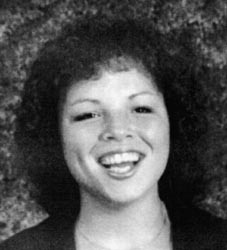
Tracy, age 7, grew up in a happy suburban family. She was only ten years past her childhood days when she vanished in September 1983.

Tracy Ann Winston trusted everyone and tried to help them. Sadly, her perception of evil was flawed, and she mistook a killer for a friend.

Tracy always loved baseball and, due to her powerful throwing arm, was one of the first girls ever allowed to play on a boys’ Little League team. Here she hugs her mom, Mertie Winston, with whom she had a special bond.
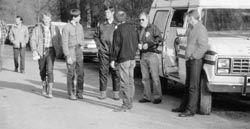
In March 1986, Green River Task Force members and Explorer Search and Rescue Scouts prepare to search Cottonwood Park on the bank of the Green River. Lt. Jackson Beard, fourth from left in green jumpsuit, directed this search as he had many others. It would be thirteen years before they identified the remains as Tracy Winston.
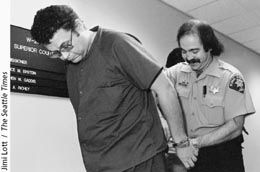
William J. Stevens II, a Gonzaga University law student, led a secret life for many years. His collections of police paraphernalia and pornography and his hatred of prostitutes triggered the Green River Task Force’s suspicion. Entering a King County courtroom in 1989, he was now the prime suspect.

Gary Ridgway, who grew up near the Strip, was a familiar commuter as he drove the highway to the job he held for more than thirty years. Here he poses with his second wife, Dana,* with whom he had a son, but they divorced in 1981.

Gary’s first two wives had issues with his mother, Mary, who continued to dominate her grown son’s life.
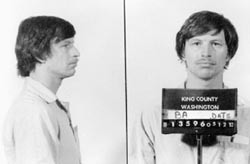
The newly single Gary Ridgway was arrested in 1982 for soliciting a prostitute, a minor charge.

Sue Peters and Randy Mullinax, Green River Task Force veterans, stand next to evidence folders. Along with Tom Jensen and Jon Mattsen, Peters and Mullinax were the detectives who questioned the prime suspect almost daily throughout the summer of 2003.

One prime suspect, a truck painter at Kenworth Trucks, denied that he had any connection to the victims. Even so, Green River Task Force detectives searched the rafters in the Kenworth plant for possible mementos—photos or jewelry—taken from the dead young women.

During their many years together, Gary Ridgway and his third wife, Judith, had gone from a camper “with a coffee can for a bathroom” to a sumptuous motorhome.

Judith laughingly called Gary and herself “pack rats,” because they spent their weekends at garage sales, swap meets, and even dumps.

Gary Ridgway, 52, under surveillance, looks around nervously as he approaches his pickup truck on November 30, 2001.

Gary Ridgway after his arrest on November 30, 2001. He was stunned to find Detectives Jim Doyon and Randy Mullinax waiting for him when he left work on that stormy Friday.

When Ridgway was arrested, he wore jeans and a plaid shirt, the clothes described by abduction witnesses—but also the clothes worn by half the men in south King County.

Gary Ridgway wears coveralls after task force detectives bagged and labeled all his clothing, so it could be searched for trace evidence on November 30, 2001.
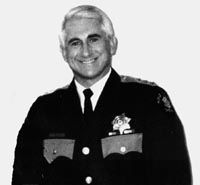
Dave Reichert, now the sheriff of King County, called a news conference with Prosecutor Norm Maleng on November 30, 2001, to announce the arrest of Gary Ridgway. Now a grandfather, Reichert was a detective for only a few months in August 1982, when he was assigned as lead detective in the murders of Debra Lynn Bonner, Cynthia Jean Hinds, Marcia Faye Chapman, and Opal Charmaine Mills.

King County Task Force investigators in the backyard of the Ridgways’ property in early December 2001. With a suspect in custody, they finally had good reason to smile. LEFT TO RIGHT: John Urquhart, Tom Jensen, and Steve Davis.
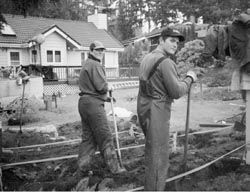
Task force investigators dug up the yard behind the house in Auburn, looking for the remains of victims still missing. After excavating the land around three of Ridgway’s houses, they replaced the dirt and plants, having found nothing at all.
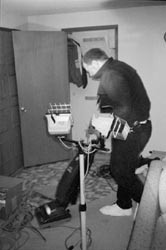
Washington State Patrol crime scene investigators processed the interior of Judith and Gary Ridgway’s present and former houses. They wore booties and latex gloves to avoid cross-contamination with evidence, but found nothing of evidentiary value.

Patricia “Trish” Yellow Robe, a beautiful member of the Chippewa Cree tribe, was found dead in 1999. An autopsy found her death to be accidental—the result of an overdose—but, shockingly, the killer admitted to her murder. He had not stopped killing in 1985 as he previously claimed.

There are dozens of young women still missing in Washington and Oregon, including Keli Kay McGinness, who disappeared in the spring of 1983. Detective Sue Peters is still actively seeking Keli. The Green River Task Force continues and probably will for many years.